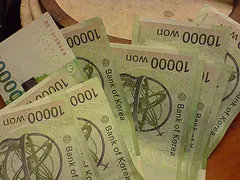
Banks banned from investing in ‘kimchi’ bonds from July 25
The direct impact of the new rules is on the KRW cross currency basis.
According to Royal Bank of Scotland, "kimchi" bonds are foreign currency denomination bonds issued onshore with proceeds swapped back into KRW for domestic use.
Here’s more from RBS:
| The direct impact of the new rules would be on KRW basis and to a much smaller extent, domestic interest rates as the issuers/ borrowers would have to turn to raising funds in the local currency. There should technically be no direct impact on the FX spot rate since these bonds were swapped from USD back into KRW. However, to the extent that 80% of the investors/ lenders are domestic branches of foreign banks - of which Japanese banks account for 52% - and the new rules would be discouraging the foreign banks from bringing funds into Korea, it could have the indirect impact on reducing the strength of the KRW. According to the Bank of Korea which jointly conducted the study on this growing breed of domestic kimchi bonds, 70% of the outstanding USD17bn issues as at end June have been swapped back into KRW. The bond stock has grown from USD15bn at the end of March, a 13% increase. 62% of the debt matures by end-2013. This amount is miniscule in comparison to: the country's total foreign currency debt stock of USD271bn accrued by the private sector; and However, the authorities were unhappy that the issuers/ borrowers were trying to circumvent earlier rules to clamp down on foreign borrowing. Those earlier rules which were introduced in November 2009 and gradually tightened through the course of 2010 have had some success in bringing down the short-term borrowing from USD155bn in March 2010 to USD135bn by end-2010 before climbing back up again to USD147bn by March 2011. This was no doubt thanks to the emergence of these domestic kimchi bonds. The direct impact of the new rules is therefore on the KRW cross currency basis. Technically, the issuers would have to pay the KRW basis when they swapped. So if they stop doing so, it would gradually see the basis rewidening/ turning more negative. KRW basis in fact has already been widening/ turning more negative in the past two months. This could have been due to the earlier warning from the authorities on these kimchi bonds or the actual the global USD squeeze as seen in the AUD and JPY basis lately. The second impact on domestic rates would be much less since the amount of domestic kimchi bonds issued is still relatively small. It is a question of whether it could potentially lead to a domestic credit crunch if this is compounded by a simultaneous USD liquidity crunch. Presently, looking at the spread of the 3m CD rate over the policy rate, we can't detect any such concern. |
Photo cerdit: kalleboo



















 Advertise
Advertise










